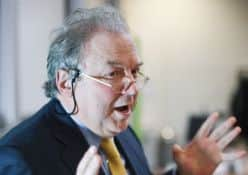Today’s corporate chiefs no match for Hanson, Branson and Sorrell, says City scribe


Sir Richard Branson outlived his rivals and critics, moved with the times and maintained an appealing brand.
Sir Martin Sorrell showed survivorship and stamina to create the world’s biggest marketing services group in WPP.
Advertisement
Hide AdAdvertisement
Hide AdMost of the “PR-puffed” business leaders of today are quite bland by comparison. That’s the verdict of Martin Vander Weyer, the Yorkshire-based City commentator.


His new book chronicles the financial and business life of the UK since 1992, the year he switched careers from investment banking to writing for a living.
Mr Vander Weyer said: “The entrepreneur business builder with a distinctive personality imposed on his business is a rarity anyway, but the whole corporate machinery, governance and the way in which chairmen and chief executives are hired in every few years militates against big personality businesses.”
He said Lord Hanson, “a good Yorkshireman, a son of Huddersfield”, enjoyed the aura he developed around him and was a very clever dealmaker.
Advertisement
Hide AdAdvertisement
Hide Ad“He was an authentic hero of a sort,” said Mr Vander Weyer. “People would say he was an asset stripper but actually he was cleverer than that.”
For many years, Mr Vander Weyer viewed Sir Richard Branson as “an over-hyped cardboard figure, all image and all marketing”, but said his view matured as the Virgin Group founder matured.
“The fact is he is still in play after more than 40 years. He has done a lot of very clever deals,” he added.
He said Sir Martin Sorrell, the chief executive of WPP, “hasn’t really put a foot wrong” as he created the British multinational advertising and public relations group. “Stamina and survivorship are important,” he added.
Advertisement
Hide AdAdvertisement
Hide AdThe son of a high-flying banker, Mr Vander Weyer was born in North Ferriby near Hull and worked for Barclays and its investment company BZW from 1981 until 1992.
The 59-year-old said one of the things he has learned about the City over the years is that finance is “fundamentally unstable”.
“It’s impossible to create a perfectly stable and adequately profitable financial sector. Somehow or other, something will always be going wrong,” he added.
His beat might be the Square Mile, but Mr Vander Weyer does most of his writing from his home in Helmsley in Ryedale.
Advertisement
Hide AdAdvertisement
Hide AdHe said: “I look at the financial and business world from a Yorkshire perspective. I look at how the economy changes first of all how Helmsley and the other small towns around here are changing.
“It is possible to observe the swings of the economy quite vividly in small town North Yorkshire life.
“You can see some pubs closing, shops closing, new businesses opening up and small industrial estates developing here or there.”
He said changing consumer tastes have been reflected by the closure of traditional shops such as draper and grocers to be replaced by therapy spas or chocolate shops.
Advertisement
Hide AdAdvertisement
Hide AdMr Vander Weyer added: “There’s a continuity of life in rural areas and small towns, which encourages the idea that the economic cycle will swing, things will get better.
“I have always thought, ever since I took up this rather odd position of being a City commentator but sitting in Helmsley with a view of the church spire from my window, that it gives me a distinctive but very rational view of the world. From Yorkshire you seen it in a proper perspective.”
* Any Other Business is published by Elliott & Thompson
Boardroom rewards not justified
Executive remuneration is twice the level it was at the turn of the new century, according to Martin Vander Weyer.
The Yorkshire-based City commentator said rewards are not justified by performance.
Advertisement
Hide AdAdvertisement
Hide AdHe told The Yorkshire Post: “There’s no sense behind it other than they are able to do that because between them they control the pay system,” he added.
“I do think that’s a worry and really don’t know how it can be scaled back down again because remuneration committees are pretty feeble and are often filled with people who are all bought into the same system.”